Iran’s Aid For Reconstruction Of Shiite Imams Shrines Increases 30%
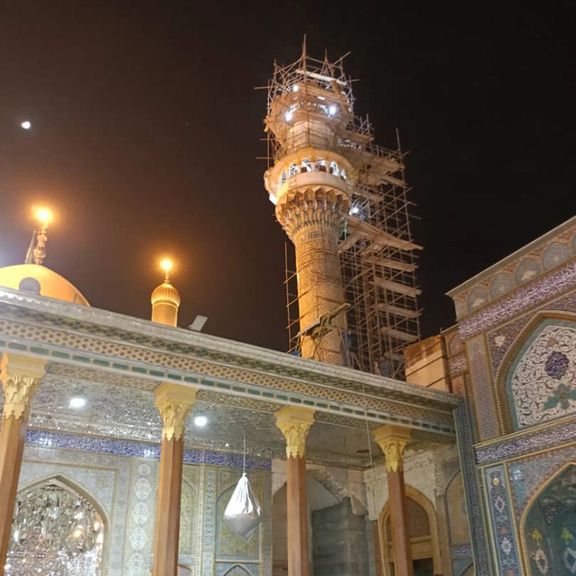
As most Iranians are struggling with dire economic conditions, the aid collected for the reconstruction of Shiite shrines in Iraq and elsewhere has increased.

As most Iranians are struggling with dire economic conditions, the aid collected for the reconstruction of Shiite shrines in Iraq and elsewhere has increased.
A member of Iran’s headquarters for the development and renovation of the graves of Shiite figures in Iraq said on Sunday that the amount of donations for projects in the previous Iranian year -- which ended on March 20 – was 30 percent more than a year ago.
Yousef Afzali said donations for the current Iranian year are expected to reach 13 trillion rials, or approximately over $52 million.
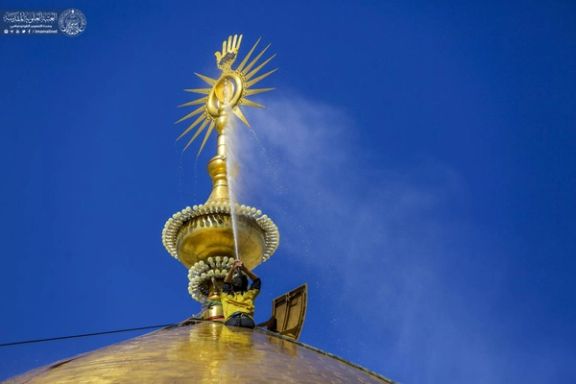
He said in addition to the development of the shrines, other projects have been planned for the reconstruction and development of the tombs of several great religious and national figures buried in Iraq, including Salman the Persian -- a companion of the Islamic prophet Muhammad and the first Persian who accepted Islam – and Rais Ali Delvari -- an Iranian independence fighter and anti-British colonial era activist.
The headquarters, which is affiliated with the Quds (Qods) force of Iran’s Revolutionary Guard, had earlier announced that more than 150 reconstruction projects for Shiite religious sites in Iraq and Syria are being funded by the Islamic Republic and will continue for the next 20 years.

Social media users have launched a twitter campaign in support of Iranian political prisoner Soheila Hijab who has embarked on a hunger strike.
According to some social media accounts which shared the hashtag #SoheilaHungerStrike, Sunday night, the lawyer and human rights activist has been on another hunger strike for days to demand her basic rights as a political prisoner.
“I see no choice but to begin another hunger strike. The officials refuse to give me my furlough despite medical advice. I have lost the use of some of my organs in previous strikes, but see no other choice”, she was quoted as saying in a letter.
Suffering from Covid late in February, the constitutional monarchist was temporarily transferred to a critical care unit (CCU) at a Kermanshah hospital following cardiac arrest after days of neglect in the prison.
Hejab was sentenced to 18 years in July 2020 for "propaganda against the regime", "forming a women's rights group" and "calling for a referendum to change the Constitution", by the notorious judge Mohammad Moghiseh.
She was first arrested in Shiraz in January 2018. Hejab who hails from a Kurdish family from Kermanshah was pardoned and freed. She was violently arrested again in June 2019 by IRGC intelligence, taken to Evin prison, and later released on a large bail.
In May 2020 she was arrested again by Revolutionary Guards' Intelligence Organization and was taken to Qarchak Prison for women in the south of the capital. She was then transferred to Kermansah prison in early January.

Iran's military will target Israel's heart if it makes "the slightest move" against the Islamic Republic, President Ebrahim Raisi told a military parade Monday.
"If you make slightest move against our nation ... our armed forces destination will be the heart of the Zionist regime," Raisi said in a televised speech from the Army Day parade in Tehran.
Raisi also referred to ever-closer cooperation between Israel and Arab states that have normalized relations with the Jewish state.
“Our message to the Zionists is that if you pursue normalization with regional countries, you must know that your smallest action is not hidden from our armed forces and intelligence bodies…,” he said.
The establishment of full relations between the United Arab Emirates and Bahrain, two Persian Gulf Arab states with Israel in 2020 was a significant setback for the Islamic Republic that has campaigned tirelessly in isolating what it calls “the Zionist enemy”.
Tehran’s nuclear program and support for militant groups in the region is what hastened the establishment of ties between Arab states and Israel, which have begun to cooperate on military and intelligence areas.

In February, Israeli defense chief Benny Gantz visited the small Persian Gulf country of Bahrain to expand cooperation, after Iran-backed Yemeni Houthis attacked UAE with missiles and drones in January.
In March, the UAE, Bahrain, Egypt and Morocco held a summit in Israel, in what was a historic development in the Middle East.
Raisi compared the Islamic Republic’s adversaries to Iraq’s Saddam Hussein who attacked Iran in 1980, a year after the establishment of the new revolutionary regime. Eight years of war followed with neither side winning. Saddam was eventually overthrown by a US invasion in 2003 and hanged by a new government.
Raisi said Iran’s enemies should look at what happened to the Iraqi leader and draw their own lessons.
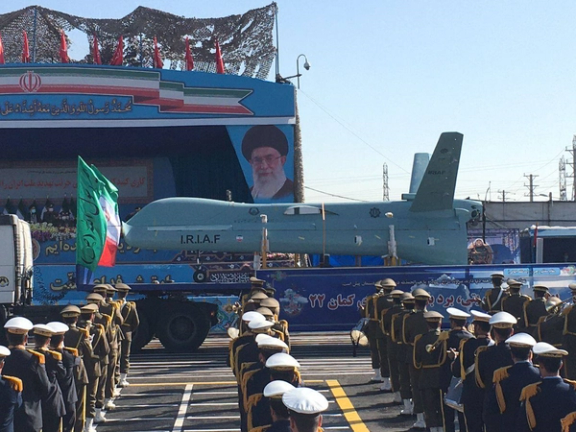
He also drew attention to Biden administration statements that the US ‘maximum pressure’ sanctions against the Islamic Republic have failed. Iranian officials have been using this line of attack against the United States, after the State Department on January 25 criticized former president Donald Trump’s withdrawal from the 2015 nuclear agreement known as JCPOA, and the imposition of sanctions on Iran.
“Today, the State Department spokesman announces in front of the whole world that we [the US] are disgracefully defeated in sanctioning and [exerting] maximum pressure on Iran, and this is the fate of those who want to confront the Islamic system,” Raisi said.
Iran’s Supreme Leader Ali Khamenei had also used this argument, saying the US was defeated and has to agree with Iran’s terms in a new nuclear deal.
Nuclear negotiations that began in April 2021 have stalled as Tehran has demanded the removal of the Revolutionary Guard (IRGC) from the US list of Foreign Terrorist Organizations (FTO).
Top Iranian officials while insisting on their “red lines” in the talks, are trying to put up a brave face, insisting that that they have been able to circumvent US sanctions by exporting more oil and repatriating the funds. The Biden administration apparently relaxed the enforcement of sanctions in 2021 as it was trying to reach a new agreement with Tehran to restore the JCPOA.

Iranian media have revealed new details about a brewing scandal related to the illegal construction of a petrochemical plant near a UNESCO wildlife reserve.
Borna news agency has reported that a man behind three companies licensed to build the project is a shady character who already owes a lot of money to government banks.
President Ebrahim Raisi ordered a new halt to the controversial petrochemical project until "ambiguities about its environmental impact" are removed, interior minister said Sunday.
On April 10, after intense controversy over the environmental impact of the project and shady records of the company behind it, Raisi called an immediate halt but media reports said the company has continued construction on the 90 hectare site close to the Miankaleh UNESCO-designated biosphere reserve.
Environmental activists have been campaigning to stop the project due to expected adverse impact on the coastal region and its wildlife and have even urged Supreme Leader Ali Khamenei to intervene. The land earmarked for the project is also said to be high-quality agricultural public land.
Borna news agency said Foulad Alborz Iranian (FAICO), one of the subsidiaries of Amirabad-e Mazandaran Limited, is at the top of the list of individuals and companies which owe massive sums to the government-owned Tose'e Saderat Bank. Iran's state banks have been publishing lists of their 'super borrowers' with largest debts this week.

Borna said it had acquired documents that showed the guarantee for the payment of the loans had been made by the company's major shareholder, Abbas Abdi, who is also a major shareholder of several other companies active in Mazandaran Province including those involved in the petrochemical project.
Individuals and entities who borrow large sums from state banks through their connections with politicians, bureaucracy or the military are known as ‘super-borrowers’ in Iran. They usually get the multi-million-dollar loans pretending to have job-creating projects, but often use the money for other purposes or simply take it out of the country and never repay. The same connections they have, often protect them from prosecution and at most they lose worthless collaterals to banks. It is believed that officials who help ‘super-borrowers’ have a stake in the schemes.
The news agency also published the image of a ruling by the justice department of Tehran that shows Abdi was sentenced to seven years in prison for fraud in 2020, in absentia. No one knows if he is now in Iran or not.
Borna said FAICO owed over 13 trillion rials ($52 million in current exchange rate) to Tose'e Saderat Bank for two foreign currency loans it received at government subsidized rates in 2016, and the interest and that the collateral offered by Abdi for the loans is worth only one-third of the sum of the original loan.
The report also suggested that Abdi who has a record of failing to pay back huge loans as well as fraud was helped by persons or entities in powerful centers to get the license to launch the petrochemical megaproject.
Several powerful figures including Parliament Speaker Mohammad Bagher Ghalibaf, the governor of Mazandaran Province and the Friday Prayer Imam of the region have strongly and publicly defended the project and some hardliners have gone as far as saying opponents of the project are in essence opponents of the Supreme Leader, thus trying to accuse them of a political crime.
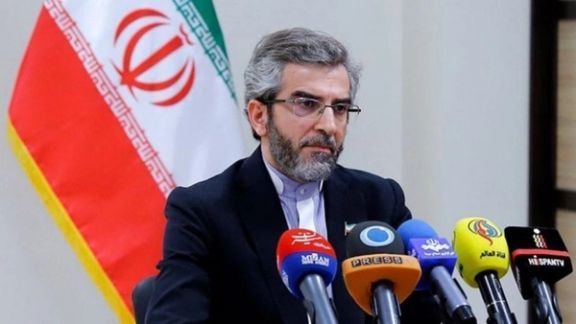
Iran's Deputy foreign minister and chief nuclear negotiator Ali Baqeri-Kani says Tehran's foreign and military policies are synergistic and complementary.
Speaking at a meeting with a group of army commanders on Sunday, Baqeri-Kani said that the Islamic Republic has thwarted the enemy's trick in driving a wedge between foreign policy and defense policy thanks to resistance under the guidance of Supreme Leader Ali Khamenei.
He said the discourse of resistance is dynamic and promotes stability, adding that lasting regional security depends on resisting aggression and occupation.
The Iranian diplomat also criticized regional Arab governments for normalizing their relations with Israel, saying such moves will never help those countries feel secure, noting that “History has proven aggression and occupation will never lead to order, stability and calm.”
“The interaction between some regional governments and the Zionist regime is similar to taking refuge in a wolf’s lair to protect oneself from the blissful spring rain”, he added.
Israel’s establishment of full relations last year with the United Arab Emirates and Bahrain was a sign of Tehran’s inability to isolate its archenemy in the region.
Baqeri-Kani, who is also Tehran’s top negotiator in Vienna talks to restore Iran’s 2015 nuclear deal known as JCPOA, made no comments about the current state of the negotiations, which came to a halt in March as Tehran demanded the removal of its Revolutionary Guard from the US list of terrorist organizations.
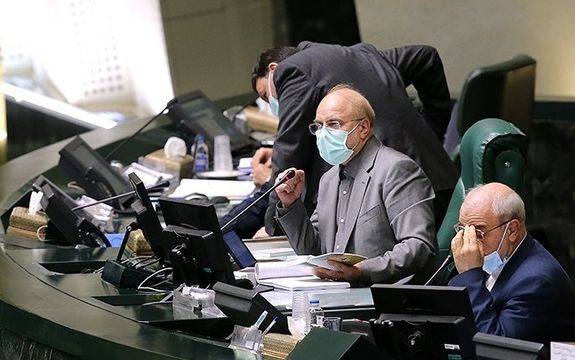
Lawmakers on Sunday strongly criticized the unbridled rise in living costs in Iran, while officials try to blame the former government for the economic crisis.
Lawmaker Alborz Hosseini warned the president and his economic team in a speech Sunday about the rising cost of living. He called the daily increase in food prices a "tsunami" and added that rents were rising uncontrollably. "It seems that nobody is thinking of vulnerable classes."
"Food on people's tables is becoming scarcer by the day and cars have become a commodity they cannot hope to own," Fathollah Tavassoli, another lawmaker, told the Parliament.
In his pre-agenda speech Sunday, Parliament Speaker Mohammad-Bagher Ghalibaf blamed previous administrations for inflation which according to official figures has now risen above 40 percent and urged the government of President Ebrahim Raisi to take action to bring the hike in prices under control.
Ghalibaf, apparently still tries to protect Raisi from rising criticism, but others say blaming the former government is simply not an answer to the crisis.
Raisi has not been able to achieve much since last August when he took office, except more clandestine oil exports to China because of less strict US implementation of sanctions by President Joe Biden’s administration. Raisi government officials boast having doubled oil exports.
But many are now asking why higher oil sales have made no difference in the economy. The government mouthpiece, Iran newspaper, said this week oil revenues are spent to offset part of the 4.7 trillion rial budget deficit inherited from the government of former president Hassan Rouhani.
The newspaper argued that "Improvement in economic indices only through increasing oil exports is not feasible because other factors such as liquidity growth also affect indices such as the inflation rate.”
President Raisi and his hardliner supporters often openly or indirectly blame Rouhani for the long-running economic crisis. Raisi on Friday said "four years of inflation above 40% and negative economic growth rate" were the main reasons for the hike in prices.
But few people dare to say publicly that the long-running economic crisis is mainly the result of sanctions imposed by the United States over Iran’s nuclear program and a new deal is imperative for saving the economy.
According to official figures the annual inflation rate rose to over 40% in the previous Iranian calendar year that ended March 20. In the same year the rate of inflation for food was even higher at 51%. Inflation rate has only risen to above 40% twice in four decades in the history of the Islamic Republic.
In his televised speech to mark the Persian New Year on March 20, Supreme Leader Ali Khamenei admitted that Iranians had faced “hardships, high prices and inflation” in the previous year but said expecting the problems to go away quickly was not "realistic".
Pundits say blaming the country's multiple crises on Rouhani and will not resonate with the public, who understands that Raisi had eight months to make an impact on the situation, and he has failed.
In the past few days Iranian media have strongly criticized the government for what they say is inefficiency and ineptitude and highlighted the hike in the prices of food items such as rice, meat, and vegetables.
Domestically grown rice, for instance, has now become unaffordable to most families. According to data published by the Statistics Center of Iran (SCI), the price of various types of domestically grown rice has tripled in one year and risen by around 11% in March alone.